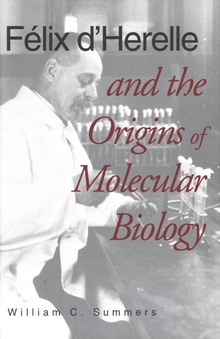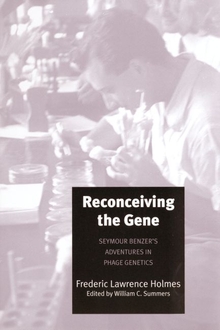Félix d`Herelle and the Origins of Molecular Biology
WARNING
You are viewing an older version of the Yalebooks website. Please visit out new website with more updated information and a better user experience: https://www.yalebooks.com
William C. Summers
Drawing on family papers, archival sources, interviews, and d’Herelle’s published and unpublished writings, Dr. William C. Summers tells the fascinating story of the scientist’s life and the work that took him around the globe. In 1917, d’Herelle published the first paper describing the phenomenon of the bacteriophage and its biological nature. A series of more than 110 articles and 6 major books followed, in which d’Herelle established the foundation for the later work of the Phage Group in molecular biology. Yet d’Herelle sometimes inspired animosity in others--he was drummed out of the Pasteur Institute, he held only one brief permanent position in the scientific establishment (at Yale University from 1928 to 1933), and he was bewildered by the social nuances of the world of international science. His story is more than the biography of a single brilliant scientist; it is also a fascinating chapter in the history of biology.
“A rich, original, and well-written book which takes the reader in d’Herelle’s footsteps, from South America to Algeria, from France to Indochina, from Egypt and India to the United States and even to the USSR. Excellent holiday reading!”—Michel Morange, History of Philosophical Life Sciences
“This vivid portrait of d’Herelle, rendered with a marvelous historical sensibility, will appeal to both scientists and historians. Summers’s conclusions about the significance of bacteriophage research for public health outside the West challenge conventional wisdom in the history of biology and medicine.”—Angela Creager, Princeton University
"Bacteriophage has been an intriguing topic from the very moment of its conflicted discovery by Twort and D’Herelle. But Twort was discouraged and made no further contribution after his initial phenomenological observation; D’Herele developed ’phage’ into a major theme of scientific and philosophical inquiry. Indeed, he set the stage for the exploration of ’phage’ as one of the most seminal tools at the birth of contemporary molecular genetic. While he was naïve about some aspects of mutations, the pioneers like Delbruck would have done well to take more seriously D’Herelle’s accurate insights about issues like lysogeny. Dr. Summers has offered this book from a platform of wisdom and experience that stretched from pathology to microbiology to history. In addition, what I most enjoyed is how well he has made his subject come alive in his human dimensions, above all his scientific zeal, but also some of his egotistical flaws and even his business acumen. It was pleasure no less than edification to read."—Joshua Lederberg, Professor Emeritus at the Rockefeller University
“Dr. Summers has made d’Herelle come alive in his human dimensions, and, above all in his scientific zeal. It is a pleasure . . . an edification to read.”—Joshua Lederberg, Nobel laureate Physiology or Medicine, 1958 and Sackler Foundation scholar, Rockefeller University
"Bill Summers takes us on a journey through the controversial discovery and early history of bacteriophage—required reading for those interested in the history, and future, of modern biology."—Stephen T. Abedon, Ohio State University
“Summers’ book . . . presents a vivid picture of Felix d’Herele’s scientific career and of the history of bacteriophage therapy. The story is a fascinating one. . . . Carefully researched, vividly written and well produced, it will appeal to everyone interested in the articulation of these activities and in the history of bacteriology and public health in the Western world and beyond in the first half of the twentieth century.”—Social History of Medicine
“This book, the only contemporary study of d’Herelle, will be of interest to historians of science and of medicine, sociologists, and anyone who is interested in the origins and growth of the biomedical revolution of the 20th century.”—Donald A Chambers, New England Journal of Medicine
“Summers presents an interesting biography of a dedicated scientist whose work eventually led to the discovery of ‘bacteriophage.’ . . . This publication is relevant for students of biology, chemistry, medicine, and the history of science. Recommended for all university and research libraries.”—Choice
“Through scholarly research, fine detail, and clear writing, Dr. Summers recreates for the reader the state of science at the time and some important steps in the advancement of knowledge. . . . [This] story should be of special interest to physicians, broadening their knowledge of the origins of some of the knowledge and technology underlying clinical practice today.”—Dwight F. Miller, Connecticut Medicine
“Summers’ text is not only wonderfully engaging in its own right, but should serve as a foundation for further inquiry into the life and legacy of one of the key figures in twentieth-century biology.”—Scott H. Podolsky, Canadian Bulletin of Medical History
"This is the biography of a great Canadian scientist, whose discoveries were all the more extraordinary because he was largely self-educated in science. . . . The story of d’Herelle’s remarkable career in science is well worth telling, and Summers brings to the task the high level of technical competence, historical skill, and honest prose necessary to do it justice.”—Mary Pickard Winsor, Canadian Journal of History
“In this biography, William Summers places the historical background of the use of bacteriophages as an experimental model system in a wider context. He vividly brings to life the struggle for priority over the discovery, as well as the controversies over the nature of bacteriophages.”—Ton Van Helvoort, Journal of History of Medicine
Publication Date: June 10, 1999
16 b/w illus.











